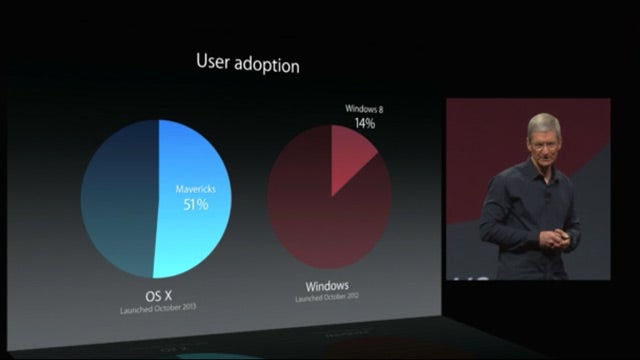Apple CEO Tim Cook openly mocks low Windows 8 adoption

Tim Cook, Apple’s CEO, started WWDC 2014 conference by bloodying Microsoft’s nose with a swift jab aimed at the lack of Windows 8 adoption by PC users.
51% of Mac users are now on OS X Mavericks, that’s more than 40 million total installs. How does this compare to Windows 8 that was launched a full year earlier than Mavericks? Well just 14% of Windows users have moved to Windows 8.
Not only has Apple got the right to be bullish about the swift adoption of Mavericks, but Tim Cook also showed an interesting statistic about the growth of Mac sales. Mac sales were up 12% in 2013, that’s in stark contrast to the 5% decline in non-Mac PC sales. That is significantly bucking the trend of steady decline in PC sales we’ve seen over the last few years.
How has Apple managed to get such a large install base where Windows 8 has struggled?
Read more: Windows 10 preview
The most obvious reason is that Mavericks is free – users do not have to spend a penny to upgrade. Windows 8, on the other hand, costs £49.99 to upgrade from another version of Windows.
Windows 8 also received a lukewarm reception from consumers and reviewers. The mishmash of touch with more traditional interfaces proved a step to far for many mouse and keyboard PC users. Microsoft Windows 8.1 resolved some of these issues but many users are still wary of upgrading.
Let’s put this into some context though. More than 90% of all computers worldwide use Windows according to Net Applications statistics in 2013.
Is Tim Cook right to boast about OS X and Mavericks? Let us know in the comments below.
Next read: MacBook Air 2014 review


